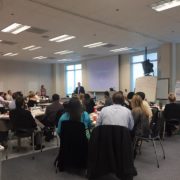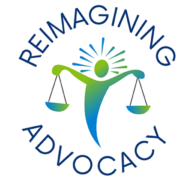The Origins of Collaborative Divorce: Stu Webb’s Letter
In 1990, a Minnesota family law attorney named Stu Webb began promoting what he deemed “Collaborative Law,” or the practice of law separating out trial work and creating negotiation specialists. Collaborative Law is now used in Tampa Bay, throughout Florida, and around the world, as families have realized that they don’t want to be placed in the adversarial proceedings of trial practice for divorce and other personal matters.
On February 14, 1990, Webb wrote a letter to The Honorable A.M. “Sandy” Keith,
a Justice of the Minnesota Supreme Court, describing Collaborative Law. Below is the text of the letter:
Dear Sandy:
I met you at a party at Steve & Marilyn Erickson’s several years ago. I was interested in your involvement with mediation. I also heard you talk last November at the Conference for Dispute Resolution Practitioners Seminar.
I, too, took Steve and Marilyn’s mediation training and have done mediation, mediation wrap-ups and, generally, have been vitally interested in exploring alternative dispute resolution in all its manifestations.
I think I’ve come up with a new wrinkle that I’d like to share with you. One of the aspects of mediation that I feel is a weakness is that it basically leaves out input by the lawyer at the early stages (sometimes that’s an advantage!). By that I don’t mean adversarial, contentious lawyering, but the analytical, reasoned ability to solve problems and generate creative alternatives and create a positive context for settlement. Of course, these attributes of good lawyering are not utilized greatly in the usual adversarial family law proceeding either.
But you and I have both experienced, I’m sure, those occasional times, occurring usually by accident, when in the course of attempting to negotiate a family law settlement, we find ourselves in a conference with the opposing counsel, and perhaps the respective clients, where the dynamics were such that in a climate of positive energy, creative alternatives were presented. In that context, everyone contributed to a final settlement that satisfied all concerned—and everyone left the conference feeling high energy, good feelings and satisfaction. More than likely, the possibility for a change in the way the parties related to each other in the future may have greatly increased. As a result, the lawyers may also develop a degree of trust between them that might make future dealings more productive.
So my premise has been: why not create this settlement climate deliberately? I propose doing this by creating a context for settling family law matters by, where possible, removing the trial aspects from consideration initially. I would do this by creating a coterie of lawyers who would agree to take cases, on a case-by-case basis, for settlement only. The understanding would be that if it were determined at any time that the parties could not agree and settlement didn’t appear possible, or if for other reasons adversarial court proceedings were likely to be required, the attorneys for both sides would withdraw from the case and the parties would retain new attorneys from there on out to final resolution.
I call the attorney in this settlement model a collaborative attorney, practicing in that case collaborative law.
The advantages of this collaborative-law model:
1. Each party is represented by an attorney of his/her choice. (This is usually not the case in mediation until after the mediation has been completed.)
2. This allows the lawyers to be focused in the settlement mode without the threat of “going to Court” lurking just around the corner. In the normal situation, settlement is often by-passed initially while the parties posture and the lawyers work on discovery.
3. There is continuity between settlement and processing the final dissolution. (This is usually not the case in mediation with the resulting problem of the lawyers not liking the mediated settlement.)
4. With the focus on settlement and avoiding court, the lawyers and clients are motivated to learn what works to achieve settlement; how to problem-solve without getting “plugged in” to the emotional content (a la “War of the Roses”). Lawyers who participate in this program will be motivated to develop win-win settlement skills such as those practiced in mediation (just like they now focus on sharpening trial skills).
5. Lawyers are freed up to use their real lawyering skills, i.e., analysis, problem solving, creating alternatives, tax and estate planning and looking at the overall picture as to what’s fair.
6. Four-way conferences become the norm with positive energies being generated (because that’s where the creative solutions lie) as all work collaboratively for a fair settlement. As in mediation, the potential is high for the clients to have a lot of input.
7. Clients and potential clients get an orientation in which they are advised of the advantages, including cost savings, of this approach and the kind of attitude and frame of mind that is most likely to achieve fair, prompt, efficient and positive settlements that work for both parties.
8. When cases don’t settle and new attorneys are retained for trial, the clients have had the best shot both ways, i.e., a settlement specialist and a trial specialist (in my experience they usually don’t come in the same package).
9. Settling matters on a collaborative basis is just more fun!
Practically, I am in the process of having lunch with some of my family law attorney-friends and inviting them to be open to participate in a collaborative model, should the occasion arise. The only requirement, as I’ve said, is an understanding by all concerned that the two attorneys would withdraw at such time as further settlement efforts appeared fruitless. The reception I have received has been encouraging.
Eventually there might be a referral listing for use by prospective clients enumerating lawyers willing to handle a matter on a collaborative basis.
Personally, about four months ago, I made the final moves to abandon my trial practice (which was already slanted toward settlement) to devote myself exclusively to a family law settlement practice. This means that I have unilaterally declared that I will not go to court in an adversarial matter. My practice is fun again!
Among other things, I spend a lot of time educating clients and prospective clients on the merits of settlement–however that can be achieved—-and of avoiding unnecessary or premature use of the courts. I also stress the mindset that is optimal for settlement. Enclosed is an article I published which I hand out and find useful in helping clients center themselves for productive settlement work.
Because of your interest in this field and the fact that we both know there’s “got to be a better way” of resolving most of these matters, I wanted to give you the above outline of what I’m up to. I would be most happy to discuss this—-or other settlement alternatives—-with you further at your convenience if you should wish to do so.
I apologize for the length of this letter. If nothing else, however, it has helped me to get my thinking on this subject somewhat organized.
Very truly yours,
Stuart G. Webb
Over 10,000 practitioners have been trained in the Collaborative Model and, locally, you can find a listing, like the one Stu envisioned, of collaborative attorneys and other professionals from Hillsborough, Pinellas, Pasco, Sarasota, and Manatee Counties at http://NextGenerationDivorce.com.
You can also learn more from a book written by Stu and fellow collaborative attorney, Ron Ousky, called The Collaborative Way to Divorce: The Revolutionary Method That Results in Less Stress, Lower Costs, and Happier Kids–Without Going to Court. The book is easy to read and geared towards spouses who are considering divorce.
I have now decided to take Stu’s lead and practice exclusively in out-of-court dispute resolution with a focus on Collaborative Family Law. In this way, I want to help families stay out of the adversarial court system and resolve their disputes privately, in a respectful setting.
To learn how Collaborative Family Law can help your family, schedule a consultation with The Law Firm of Adam B. Cordover, P.A., at (813) 443-0615 or fill out our contact form.
—
Adam B. Cordover is president of Next Generation Divorce, Florida’s largest interdisciplinary collaborative practice group. Adam is also co-chair of the research committee of the Collaborative Family Law Council of Florida, and a graduate of the inaugural class of the Leadership Academy of the International Academy of Collaborative Professionals.




Leave a Reply
Want to join the discussion?Feel free to contribute!